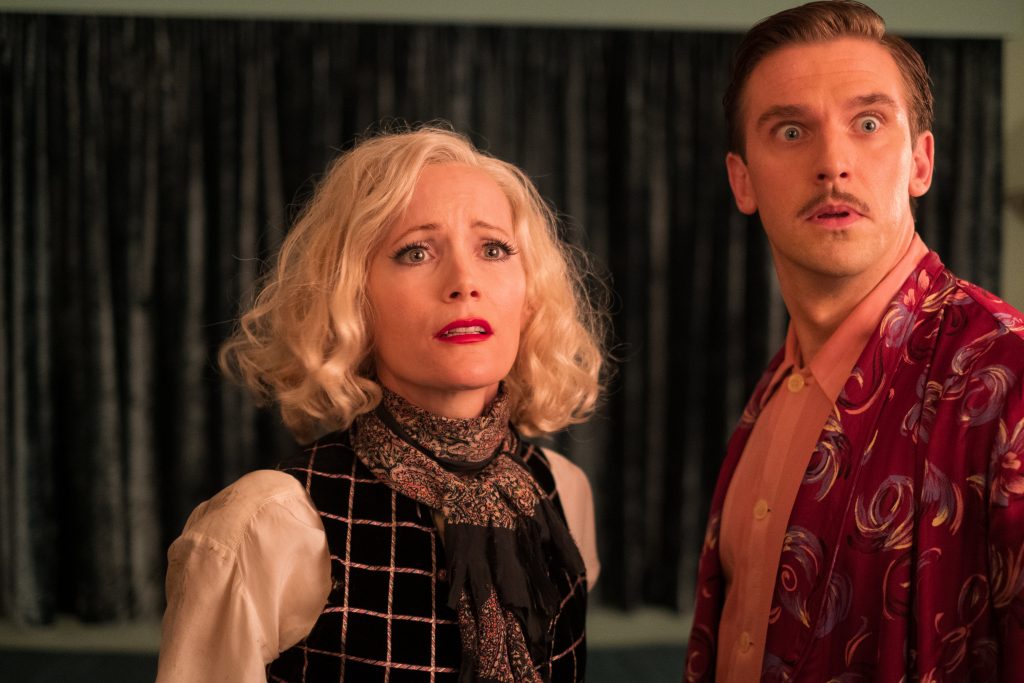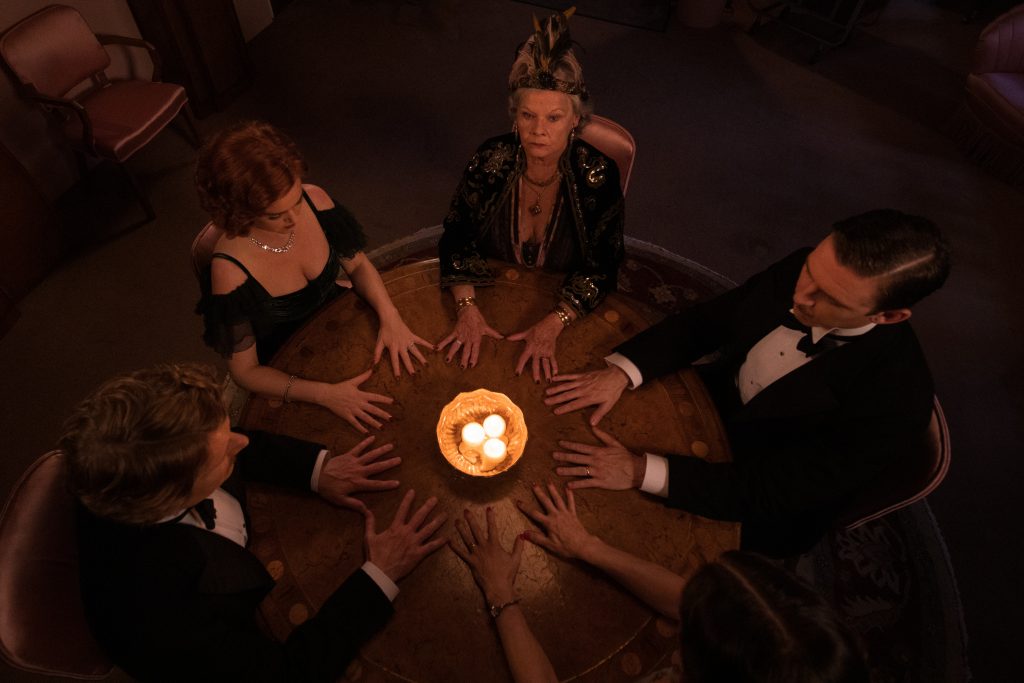August 5, 2023
by Carla Hay

Directed by Stephen Frears
Culture Representation: Taking place in 2012, in Scotland and in England, the dramatic film “The Lost King” (based on a true story) features a nearly all-white cast of characters (with a few black people and Asians) representing the working-class and middle-class and wealthy.
Culture Clash: An enthusiastic member of the Richard III Society is convinced that Great Britain’s King Richard III was wrongfully accused of crimes and that his remains are buried underneath a parking lot in Leicester, England, but she faces an uphill battle to fund the excavation.
Culture Audience: “The Lost King” will appeal mostly to people who are fans of stars Sally Hawkins and Steve Coogan and have an interest in watching predictable but crowd-pleasing history-based dramas.

“The Lost King” is the type of movie about an underestimated and persistent person where you know exactly how it’s going to end. This traditionally made drama has a very watchable journey though, mostly because of Sally Hawkins’ engaging lead performance. “The Lost King” is based on a true story, but it has a few fantastical elements, such as main character Philippa Langley talking to her imagined ghost of Great Britain’s King Richard III, who died in 1485, at the age of 32.
Directed by Stephen Frears, “The Lost King” had its world premiere at the 2022 Toronto International Film Festival. Steve Coogan and Jeff Pope co-wrote the adapted screenplay for “The Lost King,” based on the 2013 non-fiction book “The King’s Grave: The Search for Richard III,” by Philippa Langley and Michael K. Jones. “The Lost King” hits a lot of familiar beats that movies have about underdogs taking on a massive challenge with odds stacked against them. Don’t expect any major surprises in this movie, especially since the outcome of this story is fairly well-known to history buffs.
At the beginning of “The Lost King” (which takes place in 2012), 45-year-old Philippa Langley (played by Sally Hawkins), who lives in Scotland, is stuck in a dead-end sales job in an office. Six employees have been chosen to be on the company’s Super Team of sales people. Philippa is not one of those six people, much to her frustration and disappointment. Philippa has a tense conversation with her bigoted boss Tony (played by Lewis Macleod) in his office about being passed over for this promotion.
Tony says to her, “You are at the right level for you. We both know you’ve had issues.” Philippa replies, “I suffer from chronic fatigue. It’s a real illness. And yet, have I ever missed a deadline?” Tony says, “I thought it was time to give the younger ones a chance to shine.” An insulted Philippa then retorts: “If you want people to be good at being under 40, I will admit, I’m struggling there, but so are you.” And then, she walks out the door.
Philippa and her ex-husband John Langley (played by Coogan) have joint custody of and co-parent their sons Max (played by Adam Robb) and Raife (played by Benjamin Scanlan). Max is about 12 or 13 years old, while Raife is about 10 or 11 years old. When Philippa gripes to John about her job problems, she gives the impression that she’s ready to quit her job. John warns her: “Don’t do anything impetuous. That’s all I ask. We have two households to run. We need your wages too.”
Philippa will soon find something else that will preoccupy her time and her energy. One evening, she asks John to accompany her to a production of William Shakespeare’s play “Richard III,” although this production has renamed it “The Life and Death of Richard III.” Philippa says she doesn’t want to go to the play without another adult with her. John politely declines because he says he has a date with another woman.
At the play, Philippa becomes transfixed and somewhat annoyed with the story because Richard III (played by Harry Lloyd) is presented as a villain who betrayed his country. Philippa is convinced that this play has a historically inaccurate portrayal of King Richard III, who was exiled and died during a battle in 1485. He was 32 years old. Richard III was the last king of the Plantagenet dynasty and the last British king to die in battle.
King Richard III’s death marked the end of the Middle Ages in England. Henry Tudor, who led the forces that defeated King Richard III, then ascended to the throne to become King Henry VII. For centuries, historians said that King Richard III’s remains were discarded into the River Soar.
After seeing Shakespeare’s version of King Richard’s III’s life, Philippa becomes obsessed with finding out everything she can about King Richard III. She goes to bookstores and libraries for her research. Soon after she begins this research, she starts to have delusional fantasies that King Richard III is following her and talking to her. In her fantasies (which she keeps a secret), King Richard III appears to her looking exactly like he did in the Shakespeare play that she saw.
Philippa eventually joins the Edinburgh branch of the Richard III Society, a group of King Richard III fans who want history to be written to what they believe is the truth: King Richard III was not a traitor but a noble king who was loyal to his country. The Richard III Society also believes that it’s very likely that King Richard III’s remains weren’t thrown into the River Soar but are actually buried on land somewhere in England.
Philippa’s quest to find this unmarked grave becomes the main focus of the rest of the movie. She eventually quits her job, but she doesn’t tell John about it straight away. What she does tell John are her staunch beliefs about King Richard III: “He was a good man. I’m convinced of it.” There’s a change in Philippa when she goes on this quest: She feels a new purpose in her life, which gives her a rush of uplifting motivation and energy that was missing when she was stuck in a job that didn’t appreciate her.
As you can imagine, Philippa experiences major obstacles during her quest. Most historians think she’s mentally ill or very ignorant. At a King Richard III lecture given by historian RR Lawrence (played by Julian Firth), who believes in the historically taught stories about Richard III, Philippa stands up in the audience and challenges RR on his views. She asserts that Richard, during his reign, created a “fairer and more just society.” RR openly mocks her and dismisses her statements.
After the lecture, Philippa meets someone at the venue who is sympathetic to her cause: independent historian/author John Ashdown-Hill (played by James Fleet), who doesn’t have a high opinion of RR, whom he calls a “pompous old queen.” Tom tells Philippa that he’s about to publish the results of his mitochondrial DNA research of King Richard III’s descendants. Tom encourages Philippa to find out where King Richard was buried.
This search leads Philippa to a parking lot in Leicester, England, where she is convinced it’s the burial site of King Richard III. From the years 1250 to 1538, it was the location of Grey Friars Priory, where Philippa firmly believes that King Richard III was buried. (This isn’t spoiler information, since it’s in the movie’s trailer.) In order to get this parking lot excavated, she has to convince local government officials and raise the money for the excavation.
Philippa finds an ally in Richard Buckley (played by Mark Addy), a Leicester University professor. Richard’s deputy is Mathew Morris (played by Alasdair Hankinson), who also takes an interest in this project. As already shown in “The Lost King” trailer, the excavation takes place. The movie shows that Philippa got excavation money, partially through crowdfunding (she launches a website called Looking for Richard to get donations) and partially from Leicester Promotions leader Martin Peters (played by Ian Dunn), who sees it as an opportunity to get publicity for himself and Leicester Promotions.
Of course, it’s not all smooth sailing. Philippa comes dangerously close to losing funding at least once. She also experiences constant sexism from people who think she’s a bizarre woman who’s making a fool out of herself with this mission. She gets a lot of scrutiny in the media—some of it positive, some of it negative. One of her biggest skeptics is Leicester University director of corporate affairs Richard Taylor (played by Lee Ingleby), a sneering bureaucrat who doesn’t even try to hide his condescension to Philippa.
Through it all, Hawkins portrays Philippa with a plucky and determined personality. Does Philippa get discouraged? Does she experience self-doubt? Of course she does. However, since there are no real surprises in this story, Philippa’s low points in her mission also have high points.
Philippa’s obsession takes a toll on her personal life, since John begins to wonder about her mental stability and her ability to be an attentive mother to their sons. John also finds out that Philippa quit her job, so he’s worried about Philippa’s finances. On top of being openly ridiculed by certain people in society, Philippa also has to deal with the perception, even from her own children, that this mission has turned her into someone who’s not a very good mother.
After the first few scenes of Philippa talking to her imaginary King Richard III, viewers of “The Lost King” will decide if they will probably want to continue watching the movie or not. These “talking to an imaginary ghost” scenes tend to get repetitive and don’t add much value to movie, except to make Philippa look even more eccentric than she probably is in real life. Some viewers might find these “imaginary ghost” scenes a turnoff, while others will find these scenes tolerable at worst and charming at best.
Hawkins’ performance is the main thing that holds “The Lost King” together, since the rest of the cast members give serviceable performances. Hawkins tends to play socially awkward misfits in her movies, so she’s not really doing anything that’s a breakthrough, in terms of her role in “The Lost King.” However, “The Lost King” is not trying to be anything that it isn’t: It’s mostly pleasant escapism that has positive messages of perseverance in pursuing a dream, in the midst of naysayers and hostility.
IFC Films released “The Lost King” in select U.S. cinemas on March 24, 2023. The movie was released in the United Kingdom on October 7, 2022.


